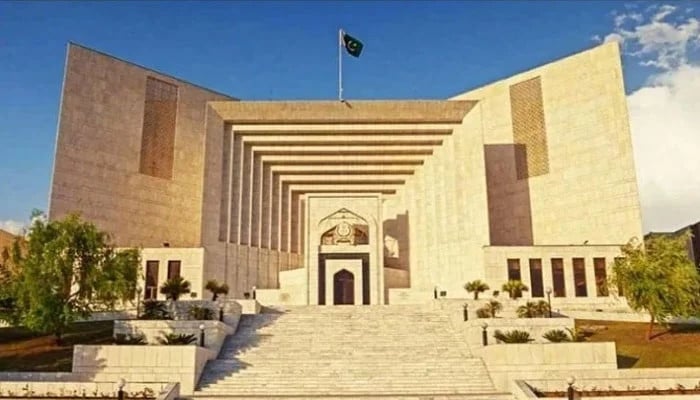ISLAMABAD: The Supreme Court on Monday returned identical petitions challenging the use of administrative powers by the Chief Justice of the Islamabad High Court and the order restraining Justice Tariq Jahangiri from performing judicial duties, raising objections to their maintainability.
It was learnt that the Registrar’s Office of the Supreme Court raised objections on separate petitions filed under Article 184(3) of the Constitution by IHC judges Mohsin Akhtar Kayani, Babar Sattar, Saman Rafat Imtiaz, and Ejaz Ishaq Khan.
It noted that the petitioners failed to clarify what question of public interest was raised or which of their fundamental rights were infringed, as required to invoke Article 184(3). Additionally, sources indicated that the petitions were objected to on the grounds that they appeared to be based on personal grievances. The Supreme Court’s ruling in Zulfiqar Mehdi vs. PIA explicitly bars petitions under Article 184(3) rooted in personal disputes. It was also objected that the petitions did not fulfill the essential requirements of Article 184(3), as they neither presented strong grounds nor clearly identified the parties to be issued notices.
The five IHC judges—Justices Mohsin Akhtar Kayani, Tariq Mahmood Jahangiri, Babar Sattar, Saman Rafat Imtiaz, and Ejaz Ishaq Khan—had petitioned the Supreme Court against their Chief Justice, accusing him of misusing administrative powers. They filed separate but identical petitions naming the IHC Registrar, the IHC Chief Justice, and the Federation through the law secretary as respondents. They sought a declaration that administrative powers cannot override judicial functions, that a high court cannot issue a writ to itself under Article 199, and that a division bench cannot assume appellate jurisdiction over a single bench’s orders. They also requested a ruling that restraining a judge from judicial duties is permissible only under Article 209, and that a quo warranto petition for a judge’s removal is not maintainable under Articles 209(7) and 199(1).
On September 16, a division bench comprising Chief Justice Dogar and Justice Muhammad Azam Khan barred Justice Jahangiri from performing judicial duties while hearing a quo warranto petition challenging his LLB degree—a move that has intensified internal judicial tensions.
Meanwhile, Justice Tariq Mahmood Jahangiri has separately filed a Civil Petition for Leave to Appeal (CPLA) against the division bench’s order, which has been assigned a case number. In a related development, the Supreme Court Registrar’s Office also returned a petition filed by Mustafa Nawaz Khokhar, leader of the Tehreek-e-Tahafuz Aaeen-e-Pakistan and former senator, seeking implementation of the majority decision of the Committee under the Supreme Court (Practice and Procedure) Act 2023. The petition urged that identical challenges to the 26th Constitutional Amendment be fixed before a full court. The Registrar’s Office objected that the petition did not specify a question of public interest and noted that individual grievances cannot be pursued under Article 184(3).
